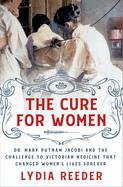
Dr. Mary Putnam Jacobi, daughter of a publishing magnate and member of New York City's high society, was a revolutionary woman. She was the first woman to be accepted to the École de Médecine at the Sorbonne in Paris, conducted groundbreaking research about the menstrual cycle, and recruited hundreds of fellow society women to the suffragist cause. She published numerous books as an individual, and brought her medical knowledge to a wider audience with her husband, Abraham Jacobi. In The Cure for Women, Lydia Reeder (Dust Bowl Girls) recounts this history via an engaging nonfiction narrative that begins in the mid-19th century, with some of the first American women physicians, and concludes with Jacobi's death in 1906.
Reeder writes boldly, pulling no punches when describing the hypocritical behavior of many men of that time, who "dreaded women as adversaries while simultaneously pitying them for their smaller brains." The book features appearances by historical figures such as suffragist Susan B. Anthony and Charlotte Perkins Gilman, author of "The Yellow Wallpaper," a story directly inspired by her treatment by a male physician with a poor understanding of women's health, and "Dr. Clair's Place," informed by her much better treatment at Jacobi's own hands. Reeder keeps readers firmly tuned in to how important and impactful Jacobi's work was.
Fascinating and timely, The Cure for Women is an excellent choice for both nonfiction lovers and those wanting deeper context for classics such as "The Yellow Wallpaper" or modern historical fiction like Hello Stranger by Lisa Kleypas. --Alyssa Parssinen, freelance reviewer and former bookseller

